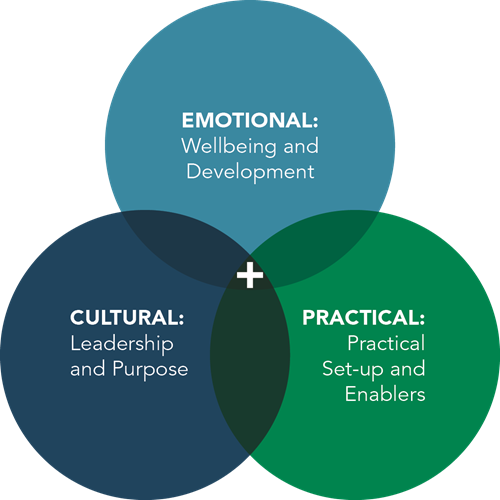Retaining the Talents of Working Carers

Carers Week, ran from 5th to 11th June this year, nudging us to ensure that the carers in our workforces remain in mind. Let’s look at what we can do to acknowledge their pressures and make practical provision.
Care for the Carers
With a tight labour market and older workers being one of the three itarget groups to fill skills gaps (along with working parents and people with long-term illnesses) it’s also a moment when leading employers are asking searching questions about how best to rebuild engagement and enhance employee experience.
Older workers and Carers are a key part of any forward-thinking employer’s talent management plan. According to Employers for Carers, 1 in 7 in your workforce will be caring for someone who is older, disabled or seriously ill and the average person has a 50:50 chance of caring by age 50. Bright Horizons’ own research has underlined the potential tension between adult care and career progression. In the Modern Families Index 2023, over three-quarters (77%) of those who indicated a caring responsibility among a UK sample population of 3,000 would need to consider their eldercare options before accepting or applying for a promotion or new job, affecting all genders (79% of female eldercarers and 75% of male eldercarers).
carried out for this year’s Carers Week, by Carers UK, Age UK, Carers Trust, MND Association, Rethink Mental Illness, Oxfam GB and The Lewy Body Society showed it can take some time for unpaid carers to recognise their role and ask for help. Nearly three quarters of people (73%) who currently provide unpaid care, or have provided care in the past, have never identified as or called themselves a carer. Eight million people who have provided unpaid care have also seen their health and wellbeing suffer.
- What should employers do to ensure those who are combining care with their career are able to stay well, have a satisfying work life and successfully deliver their work goals?
Addressing the Cultural, Emotional and Practical Aspects as an Employer
Through our work with many of the most forward-thinking employers and having coached thousands of busy professionals and line managers, we have identified three overlapping areas for action in any family-inclusive strategy. Generally, you will make a positive difference if you commit to doing 2 to 3 things well in each of the Areas below: Cultural, Emotional and Practical.
Tools to promote and apply best practice for Working Carers

Cultural: Leadership & Management
Your potential tools include:
- Leadership and Management: Strong messages from the top (emails, videos, speeches) about the importance of balancing work and life, the business case for Diversity, Equity & Inclusion, the importance of the multi-generational workforce, and championing the commitment to retaining talent while enabling workers to fulfil care responsibilities. Training for managers on managing carers, including checklists for the right conversations at the right time. Engagement Survey data segmented to reveal satisfaction levels among those with adult dependants.
- Working Arrangements: Cultural expectation that agile, flexible and hybrid (where possible) working are the norm, from senior to junior roles, recruiting to flexible working as a day 1 expectation. Measure performance on outcomes, not presenteeism. Remember, some carers also need boundaried hours (e.g. to be predictably free on a Thursday afternoon for a specific appointment). Create alternative career routes that allow a plateau then accelerate, temporary flexible working or new ways of progressing. Review work allocation practices to ensure no groups are excluded: open, honest conversations with input from the workforce on the issues and solutions.
- Carer’s Policies: Clear and engaging policies for carers, promoted to all. Consider Carer’s Leave ahead of the forthcoming which, when it comes into force, will bring a week of unpaid leave for carers.. Some leading employers create carers leave to match Unpaid Parental Leave (up to 4 weeks unpaid in any year, up to 18 weeks overall per cared-for person; some provide Consider meaning a carer can take their agreed working arrangements with them as they progress through the organisation. Consider bereavement leave and also sabbaticals. Enable staggered return from caring leave or other absence, with phased build up to full-time. Develop internal expert advisers (e.g. on policies & benefits for carers; flexible working).
Emotional: Development & Wellbeing
Your potential tools include:
- Coaching & Mentoring: Access to career & work-life coaching for carers on combining career and caring; Mentoring / buddying programmes matching carers, to share skills.
- Networks that Normalise: Internal networks where being a carer is a shared identity; Employee Resource Groups for knowledge sharing and to provide insights to inform the business.
- Content that Encourages: Webinars, blogs, podcasts, group chats for sharing experience and tips; Places to share gritty real life stories that normalise the challenges and recognise capability across diverse stories.
Practical: Enablers & Tools
Your potential tools include:
- Making work work: Technology solutions and working arrangements to enable remote working and flexible collaboration. Recognising the scope to work from alternative locations (e.g. occasional working from a relative’s home for those caring from a distance). Practical help for alternative ways of working e.g. job share register.
- Backup adult dependant care: Access to extra help when usual arrangements break down or for respite care.
- Care advice: Access to expert advice for carers on finding care, financing care, navigating the care maze, legal matters (e.g. lasting power of attorney); Benefits schemes that match life stages and provide practical resources to match life and family needs.
Caring Can Be Uplifting Too
Caring responsibilities can emerge over time or happen overnight. For the people who work for us, they can mean a lot to carry. On the other hand, and – it’s important to remember this – they can be a significant part of what gives life meaning. This NPR article by physician Dr. Shahdabul Faraz ‘My Parents Struggled In Pandemic Lockdown. Here's How They Learned To Live Again’ offers a helpful personal account that includes the worries but also the fulfilment and joy found in supporting those we love. It reflects back on the extremes of caring from a distance which so many lived through when the world locked down. However, many employees are caring for geographically distant loved ones even in ‘normal’ times and are highly familiar with the constant concerns and planning as well as the comfort that comes from seeing the loved one experience the best quality of life that they can.
Questions Carers may be asking themselves
With the wider lens of what gives work and life meaning, another way to look at the three areas of best practice above is through three key questions, as shown below.





